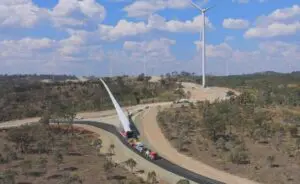Renewable energy could employ as many as 44,000 Australian workers by 2025 – an almost doubling of the 25,000 the sector employs today – but only with the right policy support for both renewables and for the establishment of a robust and secure workforce.
This is the crux of the largest study of current and projected employment in the renewable energy industry in Australia, conducted by the Institute for Sustainable Futures and the University of Technology Sydney for the Clean Energy Council.
Published on Tuesday, the Clean Energy At Work report finds that by 2025, small and big solar, wind energy, and energy storage projects could employ as many as 44,000 people under AEMO’s favoured Step Change Scenario. More ambitious scenarios could result in even more jobs.
The report also drives home the importance of renewable energy to Australia’s post-Covid economy, not just by powering a low-carbon future, but by generating much needed new jobs, particularly in Australia’s regional areas.
It finds that by 2035, around 70% of renewable energy job opportunities could be distributed across regional and rural Australia, while as many as 50% could be ongoing jobs in operation and maintenance, especially in the wind sector.
“Clean Energy At Work shows the enormous job creation opportunity from renewable energy in Australia,” said CEC chief Kane Thornton.
“It’s clear that these renewable energy jobs can have an enormous positive impact on regional communities and should be a clear priority for government as part of the COVID-19 economic response.”
“It’s vital that there is a focus on creating job opportunities outside our metropolitan centres and clean energy can deliver, allowing all Australians to benefit.”
On the flip side, however, the report warns that a failure by governments to address barriers and ensure a strong policy foundation in support of the renewable energy industry could result in 9000 jobs being lost over the coming decade.
As it stands, the Clean Energy at Work report reveals that skills shortages already exist within the renewable energy labour market, leading to a range of issues including reduced efficiencies and project delays that drive up costs.
Currently, nearly 80% of Australia’s renewable energy jobs are project based, in connection with manufacture, development, construction and installation of new sites. Almost half of those jobs in 2019 were in small-scale rooftop solar.
“Renewable energy developers and installers are facing challenges in recruiting skilled and experienced staff,” the report says.
“(They) face difficulties recruiting workers with relevant experience in certain activities, and existing training systems are not meeting industry needs.
“There is a high demand for electrical and grid engineers, and construction managers across wind and large solar projects, with developers finding recruitment for these roles challenging,” the report continues.
“In the last 12 months, two thirds of renewable energy companies that tried to recruit a construction manager had medium to high difficulty (it took more than five weeks to find a suitable candidate).”
The report calls for a review of the structure and suitability of relevant training systems across the renewable energy industry to respond to its growing need for skilled workers, while also delivering credible career pathways for Australian workers. It says that both state and federal governments have vital roles to play in establishing a robust and secure renewable energy workforce.
“The Clean Energy Council has a strong focus on raising standards for workers and communities and maintaining integrity within the industry while accelerating the uptake of clean energy,” Thornton said.
“The next step is about minimising skills shortages and creating secure, ongoing and sustainable jobs in the industry.
“We haven’t always got this right. However, this is something we’re now working with our members and stakeholders to address,” he said.
“It’s vital that the investment pipeline can give the renewables business the confidence to invest in the development of solid workforce and training practices.”
To complement the release of the report, the Clean Energy Council will host a closed-door roundtable with key stakeholders later on Tuesday, to discuss solutions to employment challenges in the renewables industry.
Among the participants in the Tuesday meeting will be the Australian Council of Trade Unions (ACTU), which is keen to ensure the renewables industry grows on a foundation of secure jobs with good conditions into the future.
“It is really important that the industry is built on solid foundations and good quality jobs,” said ACTU President Michele O’Neil in comments ahead of the roundtable.
“That hasn’t always been the case in the past, with some parts of the industry (like many other industries) relying on workers on short-term and precarious contracts.
“Unions welcome the opportunity now to work with the renewables industry to build a clean energy pipeline of secure, skilled and well-paid jobs with good conditions which will deliver enormous benefits for workers and communities across the country while tackling climate change,” he said.











